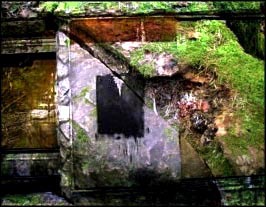
|
| Thirty-five
years later, as I wait for a bus on a windy corner, I'm still mumbling
old prayers. What gifts does the wind bring? Soot for the eyes.
Automotive fumes for the lungs. Pigeon droppings onto the head.
And a blend of aromatic scents wafting from the Moroccan restaurant
nearby.
Feb. 3
At the Douglas Fir with the plaque (Does the tree know it's been honored above all others?), I think of Robert Nadeau, one of my esteemed Aikido teachers,3 and wonder if he still carries a pack of cigarettes tucked into his hakama? Where the Wildwood Trail crosses a road, a woman entering the forest asks me if I had seen the car that had tumbled into the ravine. I had not. But now I see a police car, a Fire Department rescue vehicle, and a tow truck, blocking the road. As I begin to walk to the verge, an officer approaches: "Are you just walking through?" (An order cuffed by a question.) Further down the road, the electric company is repairing an overhead line. I tell one of the workers about the officer stopping me. He says, "Cops are territorial, like dogs." We all want to make our mark, I think as I trot away. . 5. Tomorrow, two days after "Super Bowl Sunday," is "Super Tuesday," the day when twenty-four states hold primary elections. The present "leader of the free-world" continues to test the limits of what mischief and mayhem he can get away with. Here is the archetypal Flying-Boy reaching for his Sky Father and falling every time.
Modern adolescent boys are left on their own to figure out what it means to be a man, and into this vacuum marches the military recruiter: "Boy, we'll make a man of you." If there's a war, which there usually is, the youngster thinks, "My country will be proud of me." Introduced into a war zone and finding that the enemy is as human as he, first armors the psyche, then damages it deeply.
9. The
Oregon Friends of C.G. Jung talk last night was by Naomi Kluger-Nash,
an analytical psychologist who splits her time between Michigan
and Jerusalem. She spoke at length and with passion on the Kabbalah.
My problem with Kabbalah is much the same I have with all esoteric
systems that depend on naming and figuring. With brows furrowing
arcane meaning, they miss what Kluger-Nash called "God's presentation
in the world."
When she said, "Our symptoms are a return to the womb," I returned to the little synagogue in Crown Heights, Brooklyn, half a block uphill from where I was raised. Trying to recall its halls and inner sanctum, I could only remember the claustrophobic atmosphere, as if the building generated their own humidity. Throughout my childhood this place remained unapproachable to me, as did the rituals enacted inside. By my early teens, I knew I was Jewish only by birth, later to learn that most of my relatives weren't. Thus, after Father died, instead of passing his blue pouch with the yellow Star of David, containing his tallit, tefilin, yarmulke, and prayer books, along to me, Mother tossed them away. At first I felt as if a sacred tie between father and son had been broken by a Lillithian spirit. Now I think her act had been a message that she accepted who I am not. Kluger-Nash put it this way: "There is no redemption without something breaking."
12. Opened the box to my new computer yesterday. After loading some software, the CD/DVD drive suddenly stopped. A scan told me it was a faulty driver. It took hours on the phone with a technician in India for him to accept what I already knew. We want to be reassured that there really is something progressive about human understanding. We want to feel that in a final confrontation with mortality, something profound takes place. When the end is near, we want there to be a sign of this in the work itself, some proof of accumulated insight.6 Terry Hauptman's poem, "Night - For Anna Akhmatova," has a footnote from the Russian poet whose husband was held in a Leningrad prison and subsequently executed: "In the terrible years of the Ezhow terror, I spent seventeen months in queues outside Leningrad prisons. One day someone recognized me. Thereupon a woman with frozen blue lips who stood behind me and who naturally enough had never ever heard my name from the torpor which was common to us all, breathed in my ear (we all spoke in whispers there), 'Can you describe this?' And I answered, 'I can, I can.'"7 . 15.
In the news today, a former graduate student in sociology wielding three handguns and a shotgun killed and wounded several students, then took his own life. "There were no red flags. He was an outstanding student. He was someone who was revered by the faculty and students alike."10 Everybody is law-abiding until they're not. . 16. A long dream last night ended when I said to friends with whom I was having lunch:
I spoke these words with such sincerity that my friends looked at me as if I were insufferable. The only thing I could do was to wake up.
17. "Is that Mount St. Helens?" someone asks me. It seems so long since the sky's been clear enough to see that far. "It has no peak, so that's it," I reply. Also on the trail is a small dog who wants to go home. "He has a brain tumor," his owner says. "But he does the best that he can."
20. Lunch with my neighbor, Shakti Khan, a Zen Buddhist priest who is leaving at the end of the month to open a temple in Montana. Before I moved into in this building, saw her on a streetcar in her brown robes, shaven head, and air of aloofness. A few days after I moved in, I saw her sitting in the lobby. I asked her if she would accept me as her student. Instead, we became friends. A few years ago, after returning from a truncated trip to her home temple in Hawaii, Shakti let her hair grow, and wore her robes only for priestly business, which was assisting people who had chosen to end their life. I used to think that unavailability was a mark of spiritual attunement. Now I consider how openly a person lives, the honesty of their words, and what they leave out. That one's consciousness survives death is "a radical form of mind-body dualism."12 A friend of mine talks about hidden masters as being the most advanced teachers. As humans have an adversity to what can't be seen, these hermits would be "Earth-Mother tricksters."13 Even after the Hebrew God ascended into Heaven, he still felt he had to make special appearances, finally in the format of a son. Daniel Boyarin wrote—
Is the Abrahamic God the false vision of projecting ourselves from the outside in? As Shakti and I walk to the restaurant this mild winter afternoon, dark clouds are scudding in from the ocean.
21. On my way to the university today, I saw a Native American man talking to someone who was shaking his head. Then he walked over to me and offered a medicine pouch "from Montana." I told him I have a friend, a Zen priest, who is moving to Montana soon, "But I don't have any money with me to buy the pouch." "That's okay. You can have it," he said. "Thank you, but I can't. There must be an exchange, a sacrifice." He smiled, and the lines in his face became a map of all the rivers that have disappeared. . 22.
27. A report last night on religion in America found that a surprising amount of Americans have changed their religion from the one into which they'd been born. However, although they may have changed the sect, most monotheists stayed within its fold, one rite exchanged for another, similar, one.
1-
Weishaus, J. "Old Prayers." In, Feels Like Home Again:
Collected Poems 1962-2002. www.cddc.vt.edu/host/weishaus/cont-p.htm |






